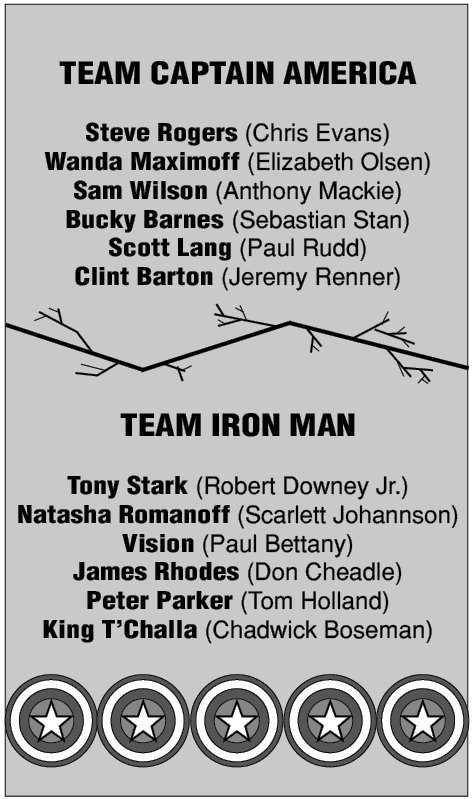Fans marvel over Captain America
Movies theaters across the country were thrown into chaos as fans chose sides for the long awaited Captain America: Civil War, released on May 6. However, whether you chose Team Iron Man or Team Captain America, the movie was an emotional attack balanced with just enough action and the perfect amount of complexity.
The movie starts off with Steve Rogers, Wanda Maximoff, and Sam Wilson fighting in Europe. The devastating events that transpire there encourage the United Nations to propose the Sokovian Accords, which would effectively neutralize the Avengers’ autonomy. The team quickly splits into sides over this document: those who want to sign – Tony Stark, Natasha Romanoff, Vision, and James Rhodes – and those who do not – Steve Rogers, Wanda Maximoff, and Sam Wilson. The appearance of Steve’s oldest friend, Bucky Barnes, who had long been on the run as the notorious Winter Soldier, serves to further divide our heroes, leading to all out conflict.
One could debate for hours whether Iron Man or Captain America was ethically right in their decision in the movie, which is what makes it so intriguing. There is no clear winner, no obvious side to choose. The pair that were once friends back in the original Avengers, and butted heads throughout Avengers: Age of Ultron, finally cracked and caused the rest of the Avengers to turn against each other in battle.
While some were sad about the absence of Hulk and Thor from this movie, the introduction of new teammates entirely made up for it. The infamous character Scott Lang made his return and brought the comedic aspect to the otherwise intense movie. In addition, a new-and-improved Spiderman was brought into the mix. This new Spiderman better reflected the original comic book character than any of his much older predecessors.
However, the character that  by far brought the most to the new team of superheroes is Black Panther. Strong and well developed, Black Panther had a powerful motivation for vengeance throughout the plot. He was one of the few characters that underwent true character development and resolved his conflicts by the end. The introduction of Black Panther successfully alluded to his own movie coming out later this year.
by far brought the most to the new team of superheroes is Black Panther. Strong and well developed, Black Panther had a powerful motivation for vengeance throughout the plot. He was one of the few characters that underwent true character development and resolved his conflicts by the end. The introduction of Black Panther successfully alluded to his own movie coming out later this year.
Marvel is notorious for forcing unnecessary subplots with unnatural romances, and they did not fail to work a relationship into Civil War. The scenes between Steve Rogers and Sharon Carter (Emily VanCamp) were very awkwardly staged and had very poor lead up. Not only was the romance unbelievable, but it was also slightly uncomfortable, given that Sharon is the niece of Steve’s former love interest from the first movie. The relationship did not advance the plot and only served to distract from the true course of the movie.
The cinematography of the film was very impressive, and utilized impressive camera shots both during and apart from the action scenes. The lighting was a relief from the usual too-dark-to-see action movies that are flooding the theater recently, as you can actually see what the characters are doing the entire time. This, along with the well choreographed action, accents each hero’s abilities and forces viewers to focus on the character, rather than the mood of the film.
In stark contrast to the rest of the mostly instrumental and urgent soundtrack, “Left Hand Free” by Alt-j brings in a lighter energy to an otherwise heavy score. The song appropriately introduces Spiderman and his upbeat personality.
Between a convincing plot, unique and clean action, and excellent character development that leaves viewers on the edge of their seats,Captain America: Civil War is another spectacular addition to the Marvel Cinematic Universe.


